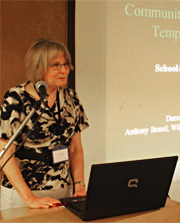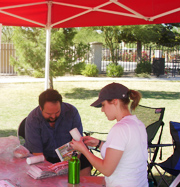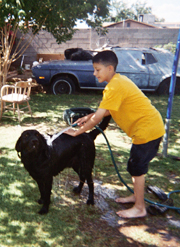April 27, 2011
Dear Board Member,
This month, as the end of the academic year approaches, our review of ASU sustainability news and activities focuses on student achievements and impacts. On page two, we feature Dr. Sharon Harlan, an expert on urban adaptation to climate change.
Highlights of ASU sustainability activities
- A multidisciplinary team of five undergraduate students launched OneShot, a new company to sustainably address infectious disease in the U.S. and Africa. The idea for the venture came from pre-med student Tyler Eltringham, who was inspired by his experiences with homelessness due to family medical problems. OneShot won a top prize of $10,000 in the ASU Innovation Challenge, a competition for students with innovative ideas to solve local or global challenges.
Read More »
- A University Service Learning class at ASU changed Entrepreneurship major Chad Fogg’s career path by introducing him to the seriousness of food security issues and social sustainability. As his project for the class, Fogg managed a $75,000 grant from United Food Bank to create a sustainable food pantry. He now plans to continue applying social entrepreneurship toward creating a positive impact for local communities.
Read more »
- Economics major Danielle Bäck has been awarded a $30,000 Truman Scholarship, the highest U.S. leadership award given to college juniors who show outstanding leadership in public service. Bäck, who is interested in the link between public health and social justice, plans to use the scholarship to pursue degrees in public health and medicine. Among her activities, Bäck has founded the ASU Coalition for Human Rights, worked with an Interfaith Peace-Builders Delegation in Israel and the West Bank, led support groups for children with HIV/AIDS in Togo, assisted a Bhutanese refugee family, and campaigned for socially responsible investing at ASU.
Read more »
- Three sustainability-minded student entrepreneurs are at work on a sustainable model for “New American Agriculture.” Their goal is a vertical hydroponic farming system that will produce high crop-yields with minimal water and nutrients. With help from a Roosevelt Institute grant, entrepreneurs Gabriel Sanchez (senior in the School of Sustainability), Kimi Bellotti (urban planning major), and Josh Judd (philosophy major) plan to launch their urban farm at ASU in fall 2011.
Read more »
- The Sustainability Review, an online journal edited and published by School of Sustainability graduate students, presented an Earth Day event on Sustainable Consumerism to help solve daily dilemmas such as “Paper or plastic? Local or organic?” Expert panelists for the discussion included Sustainability Scientists Kevin Dooley, Brad Allenby, and Eric Williams, and also Ramzy Kahhat, assistant research professor in the School of Sustainable Engineering and the Built Environment.
Read more »
- Frustrated by her experience as a public transportation user in a city with a strong car culture, graduate student Teresa Miro Martin decided to explore the social impacts of the Phoenix area public bus system and put a face on it. From this came “The Bus Project,” a combination storybook, case study, and analysis of what it means to be the “public” in public transit. Martin, a native of Spain, is an MFA candidate in the Herberger College of Design and the Arts.
Read more » | See Bus Project »
Please feel free to email or call us with any questions or comments about this briefing.
Best regards,
cc: Jim Buizer
�
Q&A With Dr. Sharon Harlan
Helping cities adapt to climate change
|
|
Sharon Harlan is a Senior Sustainability Scientist in the Global Institute of Sustainability and an associate professor in the School of Human Evolution and Social Change, College of Liberal Arts and Sciences. Her work addresses the social impacts of climate change in a rapidly urbanizing environment. She also directs the Phoenix Area Social Survey, which examines the impacts of income and residential segregation on environmental inequalities. Dr. Harlan teaches courses on the social and environmental impacts of industrial production systems and on environmental justice.
When did sustainability become part of your research focus?
Ten years ago I was working with colleagues on a proposal for a social survey about the impacts of rapid urbanization on people’s attitudes toward community and environment in the Phoenix area. Chuck Redman, then director of ASU’s Center for Environmental Studies, gave us some key advice: Frame this work in the context of the emerging concept of “sustainability.”
|
|
What are your most important sustainability-related research projects?
First, I am leading a project on urban vulnerability to climate change. This research involves social, biophysical, and health scientists in a collaborative effort to understand how various urban land covers and temperatures are associated with different neighborhoods and why we see disparities in heat-related health outcomes between low and high-income neighborhoods. A major objective of the research is to improve the capacity of inner-city neighborhoods to adapt to climate change. To accomplish this, our team is doing basic scientific research on urban ecology and health, and developing future climate scenarios for the Phoenix region. We are also working with community partners to revitalize a community gardening initiative, model the cooling effects of neighborhood parks, and learn from the perspectives of middle school students about how high temperatures affect local families and communities.
Second, I am continuing my work with the Phoenix Area Social Survey. It is repeated every five years to track public opinion on regional and neighborhood quality of life and four areas of the natural environment: land use, water supply, air quality, and climate change. This summer, we will conduct our third survey in the series, which will be administered to 900 households in 45 neighborhoods.
|
|
How will your sustainability-related research affect policy decisions?
Cities face significant health challenges from climate change and recent heat wave disasters around the world have given them a wake-up call. At the same time, climate adaptation strategies to deal with extreme heat events, air pollution, flooding, and infectious disease outbreaks have been attracting more attention globally. Our research in Phoenix provides insights about urbanization in a warmer world and also offers lessons on how cities might act to address these challenges.
|
|
What is the world sustainability challenge that concerns you most?
My priority is protecting the most vulnerable and marginalized populations from the disruptions of global environmental change. To do this, we must ensure that Earth’s resources are consumed equitably, the limits of those resources are respected, and that people in all types of economies have adequate livelihoods, health care, and safe working conditions. Ultimately, we need to eliminate extreme inequalities and poverty on global, national, and local scales.
|
|
|

Dr. Harlan discussing her Phoenix research at the Scientific Workshop on Climate Change Health Adaptation in Ahmedabad, India.
|

Graduate students Tommy Bleasdale and Carolyn Crouch making seed pots for inner-city residents as part of a discussion on gardening and urban heat island.
|

Urban heat affects pets, too – photo by middle school student Brian Garcia Escalante as part of a project to understand youth perspectives on extreme heat in inner-city neighborhoods.
|
|
|






